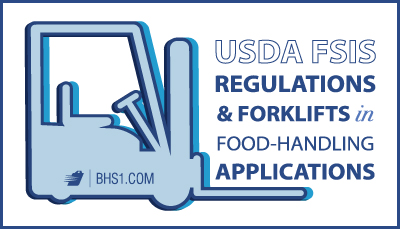We use cookies to make your experience better. To comply with the new e-Privacy directive, we need to ask for your consent to set the cookies. Learn more.
USDA FSIS Regulations and Forklifts in Food-Handling Applications
Within the U.S. Department of Agriculture, the Food Safety and Inspection Service (FSIS) is tasked with keeping unsafe food products — particularly meat, poultry, and eggs — out of the U.S. food supply chain. The FSIS carries the weight of law and conducts inspections of food-handling and processing operations to make sure they're not at risk of spreading foodborne illness.
And while the FSIS, echoing the U.S. Food Code, requires strict specifications for all food-contact surfaces and processing equipment in U.S. food-production facilities, the agency can be a little unclear on requirements for material handling equipment — starting with forklifts, the primary method of moving bulk loads around facilities.
Digging through the laws that give the FSIS its power turns up a few characteristics food producers should look for in their forklifts. In the end, you'll see why so many of the nation's food production companies prefer electric forklifts compared to their internal-combustion counterparts. 
The FSIS derives its regulatory power from the Code of Federal Regulations. In particular, these rules provide guidance on the choice of forklifts to use in food-handling applications:
- 9 CFR 416.2(d) requires facilities to include "ventilation adequate to control odors, vapors, and condensation to the extent necessary to prevent adulteration of product and the creation of insanitary conditions."
What does this have to do with forklifts? Well, as an FSIS training document on Sanitation Performance Standards (SPS), facilities would need a robust ventilation system to free fumes and emissions from gas forklifts. This is a powerful incentive for greensite food-production facilities to plan on an electric forklift fleet; without the need to vent exhaust, employers can often save on ventilation systems (provided there aren't other sources of odors and vapors present).
- 9 CFR 416.4(b) requires "non-food-contact surfaces of facilities, equipment used in the operation of the establishment" — which would, presumably, include lift trucks and other material handling equipment — to be "cleaned and sanitized as frequently as necessary to prevent the creation of insanitary conditions and the adulteration of product."
Therefore, clean-running electric forklifts could cut down on costly sanitation time, leading to a more productive operation.
- The General Rules contained in 9 CFR 416.1 states clearly that "each official establishment must be operated and maintained in a manner sufficient to prevent the creation of insanitary conditions and to ensure that product is not adulterated." As the cleanest-running class of forklifts, electric lift trucks help to comply with this crucial standard from the FSIS.
Of course, it's not just FSIS oversight that food producers must plan for. The Global Food Safety Initiative (GFSI), for instance, recommends that forklifts in produce-packing and cooling operations be either electric or propane powered to avoid contaminating product. However, propane-powered engines are not entirely emissions-free. They produce at least carbon dioxide and water vapor, and sometimes give rise to carbon monoxide and oxides of nitrogen. Electric forklifts, meanwhile, do not release emissions, making them the favorite for most food-handling operations.
While the FSIS doesn't speak to forklift power sources specifically, all of their standards point to electric lift trucks as the ideal material handling equipment in food-production applications.
References:
"FSIS Safety and Security Guidelines for the Transportation and Distribution of Meat, Poultry, and Egg Products." FSIS. Food Service and Inspection Service, U.S. Department of Agriculture, June 2005. PDF. 30 Apr. 2018.
"GFSI Global Markets Programme for Primary Production." MyGFSI. Global Food Safety Initiative, n.d. PDF. 30 Apr. 2018.
"Indoor Use of Propane-Powered Forklifts." WorkSafeNB. WorkSafeNB, n.d. PDF. 30 Apr. 2018.
"Intensified Verification Testing (IVT) Protocol for Sampling of Product, Food Contact Surfaces, and Environmental Surfaces for LISTERIA MONOCYTOGENES (Lm) OR SALMONELLA SPP." FSIS. Food Service and Inspection Service, U.S. Department of Agriculture, 28 Mar. 2013. PDF. 30 Apr. 2018.
"Sanitation Performance Standards." FSIS. Food Safety and Inspection Service, U.S. Department of Agriculture, 28 Nov. 2016. PDF. 30 Apr. 2018.
"Sanitation Performance Standards Compliance Guide." FSIS. Food Service and Inspection Service, U.S. Department of Agriculture, n.d. Web. 30 Apr. 2018.
